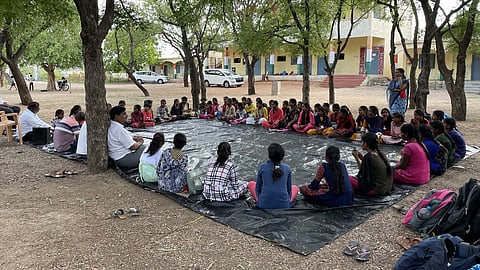

“I want to be a teacher,” said one of the girls at the Government High School in Mallata village of Raichur district in Karnataka. Some girls also expressed their desire to become teachers and help students in their studies and lives. Other girls said they wanted to become doctors, district collectors, police officers, engineers and scientists. However, the government has not appointed full-time teachers to any high schools these girls attend. There are a large number of schools across Kalyana Karnataka in the same condition, which are dubbed as ‘zero teacher schools’.
Before 2018, some high schools, including the Government High School in Mallata village, did not exist. Most girls from the marginalised communities in the impoverished rural areas of Kalyana Karnataka could not continue their education beyond Class 7, as the high schools were far from their villages. Their parents were reluctant to send the adolescent girls to distant high schools, and the girls had to stay home and look after their siblings and household work. Some of those girls became child labourers as well.
After a long and relentless struggle by the communities supported by Child Rights and You (CRY) and its partner organisation Shruti Samskruti Samsthe (SSS), the state government finally expanded some schools to high schools across Raichur, Ballari and Koppal districts in 2017-18, as part of a Kalyana Karnataka Region Development Board (KKRDB) initiative. New buildings were also built for these newly upgraded high schools. Since then, student enrolments into these high schools have seen a considerable surge, and school drop-outs as well as child labour in these areas, have been reduced significantly.
Mallata Government High School was one of these high schools. Almost all adolescent girls from the communities covered in the CRY project area were enrolled in the school. These high school girls were in the ‘Kishori Collective’, we attended. Kishori Collectives are part of the Child Collectives initiation by CRY in its operation areas, aiming to empower the children, and the community, in the field of child rights.
Around 30 students, all girls, sat in a circular formation on a tarpaulin in the shades of tamarind trees in front of the school building. They briefly went about their routine of reaffirming their awareness of child rights, self-respect, self-esteem and other life skill principles. Later, they interacted with the guests and spoke freely and confidently. Their eyes lit bright, and their faces bloomed happily when they spoke about their aims and future goals. Their voices sounded determined. They wanted to serve society as doctors, district magistrates, police officers, army officers, engineers, scientists and teachers.
And then they said, “We don’t have teachers. We need teachers. We want teachers.”
"We want to become teachers so that our future generations don’t face the same problem and lag in education,” said some girls.
Schools with ‘zero teachers’
The four-year-old Mallata High School has about 135 students in Classes 8 to 10 this academic year and has never had any permanent teachers appointed. The six teacher posts allocated for this high school have not been filled since the beginning.
Four batches have been passed out from this school completing SSLC since its inception. We were told that in the last academic year, i.e. 2021-22, there were about 125 students in the high school and the SSLC pass percentage from this school was 90% and the previous year it was 86%, all without permanent teachers.
A headmaster from Government Girls High School, Sirwar, had been deputed recently to take care of the Mallata Government High School. And very recently a mathematics teacher from Kurkund School had been deputed to this school. As the academic year began, four teachers were appointed as ‘guest teachers’.
It is not just the Mallata Government High School, but a large number of schools in Kalyana Karnataka that have no teachers appointed for full-time positions. According to recent media reports, the Kalyana Karnataka region faces a shortage of 18,282 teachers in primary and high schools. According to some reports, a staggering number of 62,910 teacher posts, including 52,321 teacher posts at the primary level and 10,589 teacher posts at the secondary level, across Karnataka state are vacant.
The government did a commendable job in upgrading some of the schools in Kalyana Karnataka to high schools, which resulted in increased girl child enrolment and reduced dropouts and child labour in these areas.
The construction of school buildings was also completed, and children can attend classes regularly. However, providing infrastructure alone is not sufficient for education. It is of utmost importance to appoint full-time teachers to retain the students in the schools and reduce dropouts.
The absence of trained and skilled educators not only affects the quality of education but also deprives the students of opportunities to excel and reach their full potential. The absence of a supportive educational environment, combined with the pressure to perform amidst these unfavourable circumstances has increased stress levels among high school children.
Investing in education and addressing the teacher shortage should be a top priority for the government to ensure a nurturing learning environment for the students. Education authorities should take immediate steps to recruit and appoint full-time teachers in all government primary and secondary schools across the state.
Meanwhile, qualified and skilled subject teachers should be made available full-time to the students to enable them to continue and complete the school syllabus according to the academic calendar.
John Roberts is the Regional Director of South, Child Rights and You (CRY). Views expressed here are the author’s own.